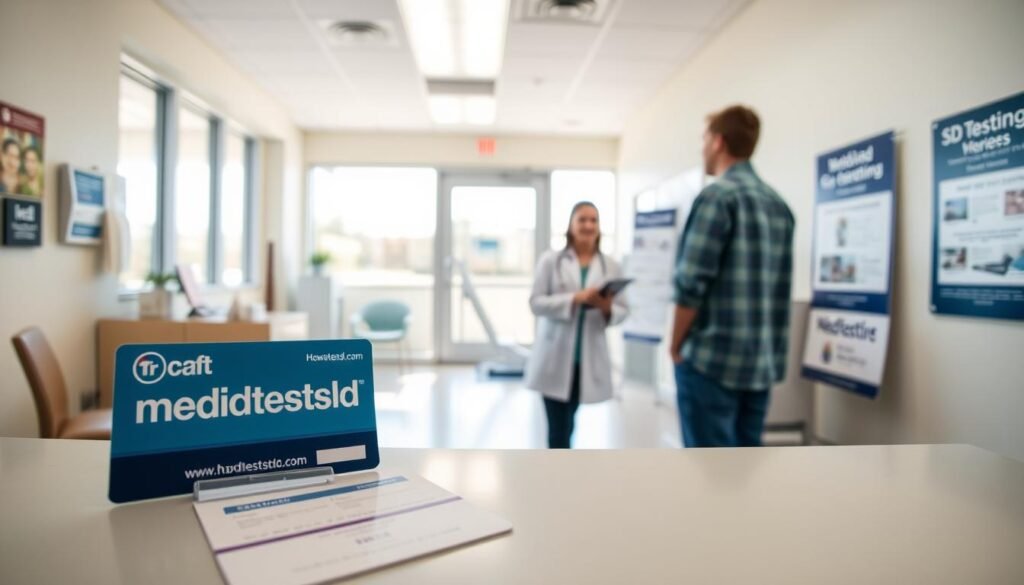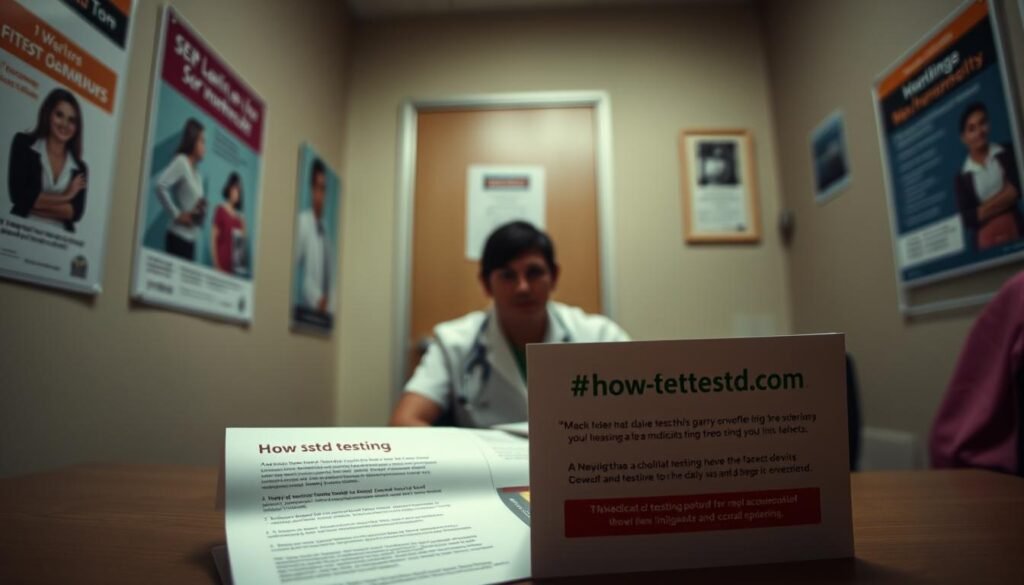STD Testing for Medicaid Patients: What You Need to Know
In 2017, nearly 2.3 million cases of chlamydia, gonorrhea, and syphilis were reported. This shows a big increase in sexually transmitted infections. It’s very important for those with Medicaid to take care of their health.
It’s key to be proactive about your health. STD testing is a big part of healthcare. Medicaid patients can get the testing they need.
Knowing what STD testing options are available is important. Don’t wait to get tested. Taking care of your health is a big step towards feeling good.
Key Takeaways
- Understanding the importance of STD testing is key for Medicaid patients.
- Medicaid recipients can get important STD testing services.
- Being proactive about health can really help avoid STIs.
- Knowing about testing options is important for your health.
- Don’t wait to get tested; it’s a big step for your well-being.
The Importance of STD Testing and Prevention
STD testing and prevention are key for public health. Sexually transmitted diseases (STDs) are a big worry in the U.S. Millions of new cases happen every year.
Common STDs and Their Prevalence in the United States
STDs like chlamydia, gonorrhea, and syphilis are common. The CDC says over 2.5 million cases were reported in 2020. “The CDC reports that chlamydia is the most frequently reported bacterial STD in the United States.”
Health Consequences of Untreated STDs
Untreated STDs can cause big health problems. These include PID, infertility, and a higher risk of HIV. “Untreated STIs can lead to serious health consequences, including pelvic inflammatory disease and infertility.” This shows why regular testing is so important.
Why Being Proactive About Testing Saves Lives
Testing for STDs early can save lives. It lets people get treated quickly and avoid long-term health issues. It’s very important for people who are sexually active.
Long-term Health Benefits
Early treatment of STDs can stop long-term health problems. For example, treating chlamydia and gonorrhea quickly can stop PID and lower infertility risk.
Preventing Transmission to Partners
STD testing also helps stop infections from spreading to partners. Knowing your STD status helps protect your partners and stop disease spread.
Understanding Medicaid Coverage for STD Testing
It’s important to know what Medicaid covers for STD testing. Medicaid helps those with low income get the care they need. It includes STD testing as part of its preventive care.
Basic Medicaid Coverage Explained
Medicaid offers healthcare to those who qualify. STD testing is seen as a preventive service and is usually covered. But, what’s covered can change.
Preventive Services Under the Affordable Care Act
The Affordable Care Act (ACA) makes sure some services are covered without extra cost. This includes STD testing. It’s meant to help people get tested and treated.
State Variations in Medicaid Coverage
Even though the ACA sets a standard, Medicaid can differ a lot from state to state. Knowing these differences is important for getting the care you need.
Expansion vs. Non-Expansion States
States that expanded Medicaid under the ACA might cover more services. This includes more STD testing. But, non-expansion states might not cover as much.
- Expansion states often cover more preventive services.
- Non-expansion states might have stricter coverage rules.
Finding Your State’s Specific Coverage Details
To find out what Medicaid covers for you, check your state’s policies. You can:
- Visit your state’s Medicaid website.
- Call your Medicaid plan directly.
- Talk to a healthcare provider or patient advocate.
STD Testing for Medicaid Patients: Coverage Details
It’s important to know what STD testing Medicaid covers. Medicaid helps low-income people get the healthcare they need. This includes free STD testing for those who qualify.
Types of STD Tests Covered by Medicaid
Medicaid pays for many STD tests. These tests help find and treat infections early.
HIV Testing
HIV testing is key. It lets doctors find and treat HIV early. Medicaid covers many HIV tests.
Chlamydia and Gonorrhea Testing
Medicaid also covers tests for chlamydia and gonorrhea. These tests use urine or swabs.
Syphilis Testing
Syphilis testing is covered too. It uses blood tests to find syphilis antibodies.
Other Covered STD Tests
Medicaid might also cover tests for other STDs. This includes hepatitis and herpes simplex virus. It depends on the state’s rules.
Frequency of Covered Testing
How often you can get tested varies. It depends on your risk and the state’s rules. Usually, Medicaid tests sexually active people under 25 and those at high risk once a year.
Documentation and Referral Requirements
To get STD testing, you need to show ID and proof you’re eligible for Medicaid. You might also need a referral from your doctor for some tests or treatments.
Knowing what Medicaid covers helps low-income patients get the care they need. This way, they can stay healthy with STD testing for low-income patients.
Where to Get STD Testing with Medicaid
Medicaid covers STD testing at many places. You can get tested at different spots, making it easy.
Primary Care Providers and Family Doctors
Start with your family doctor or primary care provider. They can test you, give advice, and send you to specialists if needed. Find a provider near you easily.
Community Health Centers
Community health centers offer affordable care, including STD testing. They are in areas where health care is scarce, making it easier to get help.
Public Health Departments
Local public health departments have STD testing. They also give extra help and resources if you have an STD.
Specialized STD Clinics
STD clinics focus on sexually transmitted diseases. They offer specific care and testing.
Telehealth Options for Initial Consultations
Many providers now use telehealth. This lets you talk to a doctor online first. It’s a good way to start getting tested.
| Provider Type | Services Offered | Accessibility |
|---|---|---|
| Primary Care Providers | STD Testing, General Healthcare | High |
| Community Health Centers | Affordable Healthcare, STD Testing | Medium |
| Public Health Departments | STD Testing, Public Health Resources | High |
| Specialized STD Clinics | Focused STD Testing and Care | Medium |
| Telehealth Services | Initial Consultations, Remote Care | High |

The STD Testing Process for Medicaid Beneficiaries
The STD testing process for Medicaid beneficiaries has several steps. It starts with a visit and ends with getting your results. Knowing this can make you feel more ready and calm when you go for testing.
What to Expect During Your Visit
At your STD testing visit, you’ll get a private and professional talk. Doctors will ask about your health history and risk factors. They will then decide which tests you need.
Types of Samples Collected
STD testing might need different samples, based on the tests needed.
Blood Tests
Blood tests check for HIV and syphilis. A small blood sample is taken from your arm.
Urine Tests
Urine tests find chlamydia and gonorrhea. You’ll give a urine sample in a private spot.
Swab Tests
Swab tests take a sample from areas like the cervix or urethra. They’re used for chlamydia and gonorrhea tests.
Timeframe for Results and Follow-up
How long it takes to get your test results varies. It’s usually a few days to a week. Your doctor will talk about the results with you. They’ll also tell you what treatment or more tests you might need.
Knowing the STD testing process helps Medicaid beneficiaries get the care they need. It makes them feel more confident in the healthcare system. They can get the right treatment if they need it.
Navigating Possible Barriers to STD Testing
STD testing is very important. But, Medicaid patients often face problems getting it. It’s key to know these issues to help people get the care they need.
Transportation Challenges and Solutions
Transportation is a big problem for Medicaid patients. Many use public transport, which can be hard to rely on. Health centers help by giving rides or using telehealth.
Finding Time for Appointments
Busy lives can make it hard to get tested. Clinics help by being open longer or being flexible. Prioritizing STD testing is key for everyone’s health.
Addressing Stigma and Embarrassment
Feeling shy about STDs can stop people from getting tested. Doctors can make a safe and understanding place. This helps people feel okay about getting tested.
Language and Cultural Barriers
Language and culture can also be barriers. Doctors help by speaking different languages and being sensitive to culture.

| Barrier | Solution |
|---|---|
| Transportation Challenges | Transportation assistance programs, Telehealth options |
| Busy Schedules | Extended clinic hours, Flexible scheduling |
| Stigma and Embarrassment | Supportive healthcare environment |
| Language and Cultural Barriers | Language interpretation services, Culturally sensitive care |
By tackling these issues, Medicaid patients can get affordable STD testing more easily. This helps them stay healthy.
Eligibility Requirements for Medicaid STD Testing
It’s important to know who can get Medicaid STD testing. Medicaid helps many people who don’t make much money. It’s a program that works with the federal and state governments.
General Medicaid Eligibility Criteria
To get Medicaid, you must meet some rules. These include how much money you make and how big your family is. How much you can make varies by state. It also depends on your family size and who lives with you.
Special Provisions for STD Testing Services
Some states let Medicaid cover more services, like STD testing. This makes it easier for those who qualify to get tested.
Family Planning Services and Expanded Eligibility
Medicaid covers family planning services, like STD testing, for some people. Some states have made it easier for more people to get tested. This is good news for those who need it.
Presumptive Eligibility Options
Presumptive eligibility lets some places help people get Medicaid for certain tests. This includes STD testing. It’s based on if they seem to qualify at first.
Confidentiality and Privacy Concerns
STD testing needs to be private and safe for Medicaid patients. It’s important to know how your info is kept safe.
HIPAA Protections for STD Testing
The Health Insurance Portability and Accountability Act (HIPAA) keeps your health info safe. HIPAA protects all healthcare providers and health insurance companies, including Medicaid. So, your STD test results are safe from being shared without your okay.
Explanation of Benefits and Privacy Considerations
When you get STD testing through Medicaid, you might get a statement that doesn’t show what you got tested for. This keeps your testing private. You should know that these statements are sent, but they don’t show STD testing details.
Minor Consent and Confidentiality Rules
For teens, rules about getting tested for STDs and keeping it private vary by state. In many places, teens can get tested without telling their parents, and it’s kept private. Knowing the laws in your state is key.
Discussing Privacy Concerns with Your Provider
Talking to your doctor about privacy is important. They can tell you how they keep your info safe. Talking openly with your doctor can help you feel better and get the care you need.
If you’re looking for free STD testing Medicaid or Medicaid STD testing centers, knowing about privacy can help you feel safe. It lets you get tested without worrying about your privacy.
- Confidentiality is protected under HIPAA for all Medicaid patients.
- Minor consent laws vary by state, affecting confidentiality.
- Discussing privacy concerns with providers can ease patient anxieties.
Recommended STD Testing Frequency
Getting regular STD tests is very important for staying healthy. How often you need to get tested depends on your risk. Knowing this is key, even more so if you have Medicaid.
CDC Guidelines for Routine Testing
The Centers for Disease Control and Prevention (CDC) has clear rules for STD testing. They say chlamydia and gonorrhea screening is needed every year for women under 25 who are active. They also suggest it for older women with risk factors like new or many partners. For more info, check the American Academy of Family Physicians’ STD guide.
Risk Factors That May Require More Frequent Testing
Some things can make you need to get tested more often. These include having multiple sex partners, not using protection, or having had STDs before. If you’re in these situations, talk to your doctor about how often you should get tested.
Special Considerations for Different Populations
There are special things to think about for different groups when it comes to STD testing.
Pregnant Women
Pregnant women get tested for STDs at their first visit. This is because some infections can harm the baby. They might need to get tested again in the third trimester if they’re at high risk.
Men Who Have Sex with Men
Men who have sex with men face a higher risk for some STDs, like HIV and syphilis. The CDC says they should get tested at least once a year. If they keep having risks, they might need to get tested more often.
People with Multiple Partners
Those with many partners are at a higher risk for STDs. They might need to get tested every 3-6 months.
Individuals with Previous STD Diagnoses
If you’ve had an STD before, you’re at risk for it again. You should get tested again, usually within 3 months after treatment. This makes sure the infection is gone.
Following these guidelines can really help lower the risk of STDs. It also makes sure you get treated quickly if you do get an infection.
Treatment Options After Positive STD Results
Getting a positive STD test is just the start. It’s important to look into treatment options. Medicaid helps a lot with these treatments.
Medicaid Coverage for STD Treatments
Medicaid covers many STD treatments. This means people can get the care they need. They cover antibiotics for bacterial STDs and antiviral meds for viral ones.
Common Treatments for Various STDs
Treatment varies by STD type. Bacterial infections get antibiotics. Viral ones need antiviral meds. Knowing your treatment is key.
Follow-up Testing Requirements
After treatment, more tests are needed. This checks if the infection is gone. The timing depends on the STD and treatment.
Partner Notification and Treatment
Telling sexual partners about the STD is also important. Medicaid helps with this. It makes sure partners get the care they need.
| STD Type | Common Treatment | Follow-up Testing |
|---|---|---|
| Bacterial (Chlamydia, Gonorrhea) | Antibiotics | 3-6 months after treatment |
| Viral (Herpes, HIV) | Antiviral medications | Ongoing, as managed by healthcare provider |
Conclusion
Getting tested for STDs is key to staying healthy. As a Medicaid patient, you have many testing options. Knowing about STD testing, what Medicaid covers, and treatment choices is important.
Medicaid STD testing helps those who need it most. Using these services can keep you and your family safe from STDs’ bad effects.
Learning about Medicaid STD testing and using available resources is important. It helps you stay healthy and happy. Medicaid’s STD testing coverage is a big help, making your life better.
FAQ
What is covered under Medicaid for STD testing?
Medicaid covers tests for STDs like HIV, chlamydia, gonorrhea, and syphilis. This is part of its preventive services. The details can change based on the state.
How often can I get STD testing with Medicaid?
How often you can get tested depends on your risk and the state’s rules. The CDC has guidelines for testing. Talk to your doctor to find out how often you should get tested.
Where can I get STD testing with Medicaid?
You can get tested at many places. This includes your doctor, community health centers, and public health departments. You can also use telehealth for the first visit.
What are the eligibility requirements for Medicaid STD testing?
To get tested, you need to meet Medicaid’s general rules. There are special rules for STD testing and family planning. Check your state’s rules for more info.
Is STD testing confidential under Medicaid?
Yes, Medicaid keeps STD testing private. HIPAA rules protect your medical records. In many places, minors can get tested without telling their parents.
What happens if I test positive for an STD with Medicaid?
If you test positive, Medicaid will cover treatment. You’ll get treatment based on CDC guidelines. You’ll also need follow-up tests and help in telling your partners.
Can I get STD testing at a community health center with Medicaid?
Yes, community health centers offer testing to Medicaid patients. They provide affordable services, including STD testing. They are great for people who can’t afford much.
How do I navigate possible barriers to STD testing with Medicaid?
To get tested, you can solve problems like getting to the test site. You can also find time for appointments. Overcoming shame and language barriers is also important.
Are there any additional resources for STD testing with Medicaid?
Yes, there are more resources. You can use telehealth, visit specialized clinics, or go to public health departments. These help with testing and treatment.
What are the recommended STD testing guidelines for Medicaid patients?
The CDC has guidelines for testing. Medicaid patients should talk to their doctor. The doctor will decide how often you need a test based on your risk.


